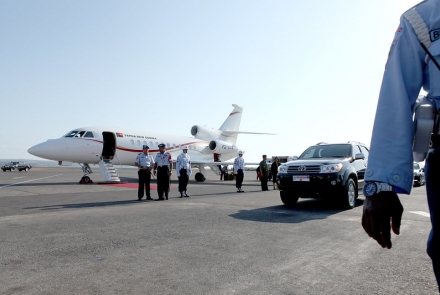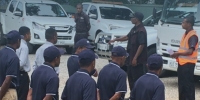
Public-private policing partnerships
In many important areas, private security can be the partner the police need to deliver public safety and security outcomes in Papua New Guinea, Sinclair Dinnen and Grant Walton write.
Soon after his appointment as Papua New Guinea’s (PNG) Police Minister, Bryan Kramer promised to reform PNG’s police force — the Royal Papua New Guinea Constabulary (RPNGC). The former opposition member and outspoken critic of the previous O’Neill government outlined a range of measures, including providing more opportunities for women, addressing corruption and improving discipline. An adept user of social media, he encouraged citizens to record and report crime and police misdeeds using Facebook and other digital platforms.
The reformist momentum initiated by Minister Kramer is also highlighted by the emergence of a cadre of young officers – including Police Commissioner David Manning – who appear genuinely committed to improving the standing of the police with the broader public by tackling issues of ill-discipline and brutality that have eroded trust in the organisation.
While Kramer has since become Minister for Justice, he and Manning have provided critical leadership on the vexed issue of police reform.
Despite these encouraging signs, improving policing and security in what is regularly depicted as one of the world’s most insecure countries remains a formidable challenge. In a characteristically candid Facebook post, Kramer described the organisation he inherited as Police Minister in the following terms:
‘I found our Police Force in complete disarray and riddled with corruption. The very organisation that was tasked with fighting corruption had become the leading agency in acts of corruption. Add to that a culture of police ill-discipline and brutality.’
The RPNGC remains massively understaffed, poorly resourced and heavily factionalised, and has a limited presence in many parts of the sprawling and still overwhelmingly rural country. According to a recent study for the Australian-funded PNG–Australia Policing Partnership, the RPNGC faces an average recurrent funding gap of 126 million Kina ($50.8 million) per annum and would require a one-off injection of approximately 3.9 billion Kina ($1.6 billion) to enable it to deliver its service mandate.
Even if reforms can improve the performance and standing of the organisation, the country’s serious fiscal crisis, accentuated by the worsening COVID-19 pandemic, means that reformers will also need to look beyond the RPNGC to find answers to PNG’s security problems.
One possible place to start looking would be PNG’s booming private security industry. There is significant overlap between the activities of private security companies and PNG’s police. Larger private security companies engage in many of the same kinds of policing activity as their uniformed colleagues, including crime prevention, investigations, and responding to incidents.
Senior company managers often have police backgrounds and maintain strong networks within the RPNGC. Relationships between the industry and police, though fractious at times, can be mutually beneficial.
While primarily motivated by profit, elements of the industry already contribute to public security through their interactions with the police and particular communities. The industry also employs a very large number of citizens in a country where lack of employment opportunities is a major contributor to law and order problems. According to some, the industry is now the third largest employer in the country. Without the private security industry, PNG’s security challenges would likely be considerably worse.
However, as the industry has grown, so too have stories of violence, theft, and other misdeeds by security personnel, albeit not on the scale of transgressions attributed to the police. There is a clear need for improved governance if the private security industry is to be an effective partner in delivering public security outcomes in PNG.
When it comes to regulating private security, PNG is something of a regional leader as the first Pacific Island country to attempt to regulate its private security sector. It’s currently one of only three countries in the region – along with Tonga and Fiji – to have enacted dedicated legislation for this purpose.
The Security (Protection) Industry Act 2004 provided for the establishment of the Security Industries Authority (SIA), which commenced in 2006. The SIA now provides licences — and thus a level of regulation — to a relatively small proportion of firms.
SIA figures from 2017 estimated that there were 219 unlicensed security companies with around 7,649 security guards operating illegally. However, unofficial estimates from industry sources put the number of illegal operators as substantially higher, with up to 80 per cent of companies operating without licences or permits.
Despite only covering a small proportion of the industry, the SIA’s efforts have helped significantly increase the number of licensed private companies by tracking down unlicensed security companies.
There are also a number of international codes and agreements that provide another potential source of regulation for private security companies. These aim to supplement domestic oversight in the countries where private security companies operate.
The most relevant is the International Code of Conduct for Private Security Providers (ICoC) which focuses on human rights principles, such as use of force, detention, identification and registration, personnel vetting, record keeping, weapons management and training, and incident reporting.
While development of transnational forms of regulation remain at a relatively early stage, the most obvious limitation is their voluntary character. There is also the risk of them being dominated by the most powerful industry players.
On a more optimistic note, membership of ICoC can also become a valued mark of differentiation in a notoriously competitive industry. For example, Guard Dog Security, the largest PNG-owned company, now promotes its membership of ICoC to prospective clients.
The COVID-19 pandemic and changes to the country’s security leadership provides an opportunity to rethink the governance of PNG’s security landscape. Despite many challenges around regulation and the sometimes fractious relationships between private security organisations and other providers, at the very least there is potential for greater and strategic collaboration between the private security industry, police, and community organisations, such as through local policing coalitions.
The question now is how to best support these collaborations in ways that minimise risk, complement state-building efforts, and enhance security for PNG’s population, particularly its most vulnerable and marginalised members.
Updated: 22 November 2024/Responsible Officer: Crawford Engagement/Page Contact: CAP Web Team












